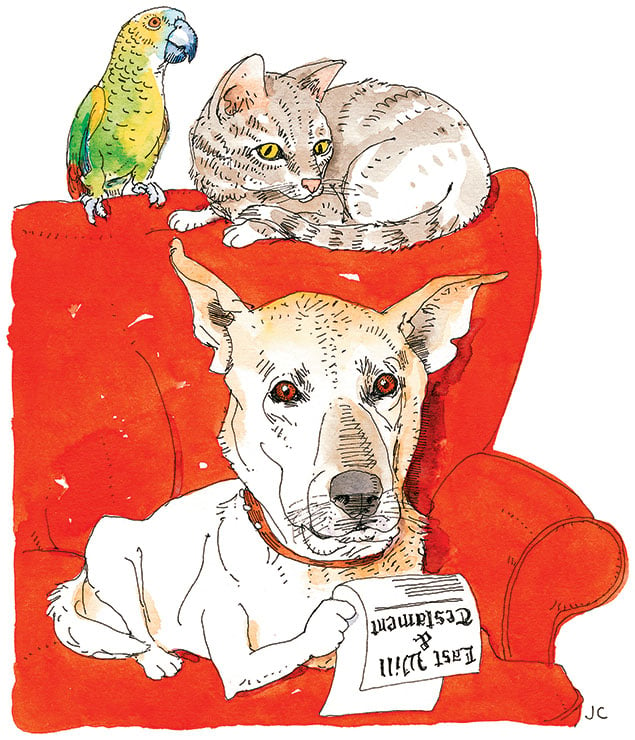I recently asked my parents who would get their Shih Tzu, Molly, if something were to happen to them. “You would take her,” my mom said. It seemed like the obvious answer. My husband and I both grew up with dogs, and mine were always Shih Tzus. But our 50-pound mutt, Bailey, doesn’t like Molly. He’s great with most dogs, but when he sees Molly he snaps at her and takes her food. “I’m not so sure that would work,” I told my mom.
She laughed and said she was taking us out of her will: “If you don’t want the dog, you’re not getting the money, either.”
I asked if she’d ever talked to her lawyer about Molly, the way you do about a child. “It never even crossed my mind,” she said.
Rockville attorney Ellen Walker sends a questionnaire to new estate-planning clients. Among the questions: “Do you have pets?” She added that line after hearing about an elderly woman whose grown children refused to care for the dogs she’d left behind. “The dogs were like her babies,” says Walker. “The day after she died, someone swooped in and took them to the Humane Society.”
Six years ago, when real-estate mogul Leona Helmsley left $12 million to her Maltese, the idea of a trust fund for a pet seemed silly. Now pets are an estate-planning specialty. LegalZoom, a service that enables users to create legal documents, recently partnered with the ASPCA to offer a $39 Pet Protection Agreement, which lets owners name a guardian for their animals. More than 300 people buy the agreement online each month.
One solution Walker offers is a pet trust, a legally sanctioned agreement providing for the care of an animal after its owner dies. An owner designates a caregiver for the pet and appoints a trustee to manage funds to cover food, vet bills, and more. Alexandria attorney Patience Alexander says planning ahead is particularly important for people with large or loud pets or animals with special needs.
Some people leave detailed instructions—how often a dog should be walked, how a cat likes to be held. Walker asks clients to fill out a “pet personality profile,” including details about the animal’s favorite toys and where it likes to sleep.
Unlike wills, pet trusts take effect as soon as an owner dies. Some include provisions for a pet in the event that an owner becomes disabled. “Putting an animal in your will is great, but wills take a long time to kick in,” says Julie Conway, chief development officer for the Washington Humane Society, which takes in about 35 animals each year due to an owner’s death. “You need someone to care for that animal immediately.”
Sharon Lofgren of Laytonsville hopes to outlive her horses, Jiminy and Verde, but she left them to her sister just in case, along with enough money to house and feed them. Horses can live 25 to 30 years, and Lofgren has had friends who got stuck with somebody else’s horses after an owner passed away. “You can’t assume, ‘Oh, sure, somebody will take my $15,000-a-year liability,’ ” she says.
One Montgomery County woman left her house to the caregiver she chose for her cats because she doesn’t want the cats removed from their home. “Cats are more attached to their place than their person,” she says.
A single mother included a line in her pet trust about visitation rights for her son, in case the little boy ever ends up separated from his dogs.
People with more than one pet have to find someone willing to take all of them—or arrange separate homes for each. The Washington Humane Society’s Conway knows she can’t expect one person to keep her 110-pound rottweiler and her pit bull. “No matter how much someone loves me, that’s a huge commitment,” she says. She has asked her mother to take one dog and her father to take the other. “We laugh about it now, but God forbid—you want to make sure your pets are taken care of.”
This article appears in the March 2013 issue of The Washingtonian.


















